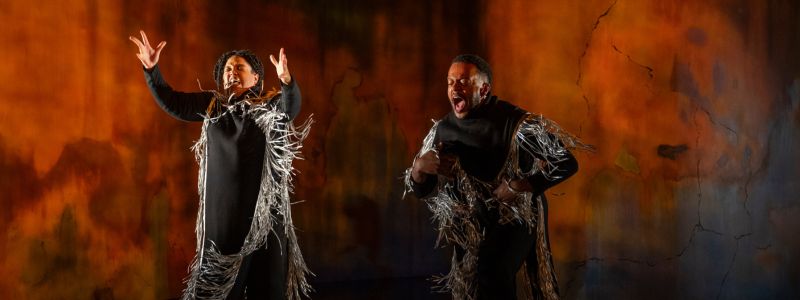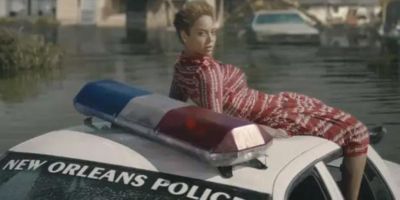Pre-Show Vocabulary Activity

This activity guides students through an exploration of allusions in popular culture and in Antigone before they learn about a new-to-them allusion in Greek mythology.
Allusion Activity
- Activity Preparation
- Supplies
- Paper and writing utensil (one per student)
- Note: students will be illustrating both sides of their paper
- Art supplies for drawing
- Students will need access to the digital Antigone Learning Guide Glossary as well as a search engine
- Paper and writing utensil (one per student)
- Set-Up
- This activity provides several music videos as examples of allusion. Consider reviewing these videos and selecting your preferred examples before class, as some of them contain mature content.
- Supplies
This activity will take approximately 65 minutes.

- Learning Sequence
- Display the word allusion for the class. Invite students to share or guess a definition for the word. (~2 minutes)
- If students are unfamiliar with the word, display or share the following definition:
- Allusion (n): as a literary device, a mention of something with cultural, political, literary, or historical significance, either directly or indirectly. (~1 minute)
- Ask students to think of any allusions they might be familiar with from media or pop culture. Invite them especially to think about any musical artists who often make references to other artists visually in videos, lyrically, or through sampling – this can make musical allusions easy for students to access. (~7 minutes)
- If students are struggling to think of examples, point them to some of the following videos:
- “Walk It Talk It” by Migos feat. Drake (References Soul Train)
- “thank u, next” by Ariana Grande (References several 90s-2000s teen movies, including Clueless, Bring It On, and Legally Blonde)
- “All The Small Things” by blink-182 (References 90s boy- and girl-band videos and culture)
- “This is America” by Childish Gambino (References Jim Crow laws and incidents of police brutality and incidents of mass murder by white supremacists)
- “Formation” by Beyonce (References Hurricane Katrina and Black Lives Matter protests, among other cultural and historical events)
- “Pretty Girl Rock” by Keri Hilson (References Josephine Baker, Diana Ross, Janet Jackson, and more)
- Note: You may wish to view these videos before showing them to students; some contain mature themes.
- If students are struggling to think of examples, point them to some of the following videos:
- Optional: Show students this 5-minute video giving an in-depth overview of allusions with helpful examples from Disney movies. (~5 minutes)
- Note: Some of the examples go by quickly; consider pausing on a few of them to discuss them with students.
- Guide students to access the Antigone Learning Guide Glossary. Have them skim through the terms. Prompt them to pay attention particularly to the words that contain references to Greek mythology, rather than academic vocabulary words. (~5 minutes)
- Pair students. Have each pair pick one Greek mythology allusion from the glossary to explore more deeply. Though each term has a brief description within the glossary, students should conduct an internet search to learn more about that allusion. They can read longer narratives of the reference, look at images and artistic renderings, etc. (~10 minutes)
- Have each student illustrate one side of their piece of paper to reflect their chosen allusion from Antigone. Their work may include words and images, and they can approach it however they’d like. Remind students that they do not need to be an extraordinary artist to do this activity. However, students should endeavor to include, in whatever way they wish, the following elements about the allusion: (~15 minutes)
- Key people or characters
- Who are they?
- What are they like?
- What is their status/role in the world/story?
- Relevant setting
- The basic plot or conflict
- Emotions or situations related to the allusion
- When in life might this story provide comfort, inspiration, or comparison?
- Under what circumstances might this reference come to mind?
- Do you know of any texts that allude to your chosen story/myth?
- Key people or characters
- Direct students to individually dive into another allusion to Greek mythology, not mentioned in the glossary (and therefore not mentioned in Antigone). They should again read up on the story associated with the reference, look into any visual representations they might find, and illustrate the other side of their paper with this allusion using the same prompts as those in Step 5. (~10 minutes)
- As time allows, invite students to share their one-pagers in small groups or with the class. Consider displaying them in the classroom at the end of the activity. (~10 minutes)
- This activity addresses the following standards:
- Illinois Arts Learning Standards
- Anchor Standard 1: Generate and conceptualize artistic ideas and work.
- Anchor Standard 2: Organize and develop artistic ideas and work.
- Anchor Standard 7: Perceive and analyze artistic work.
- Common Core State Standards
- CCSS.ELA.RL1 Read closely to determine what the text says explicitly and to make logical inferences from it; cite specific textual evidence when writing or speaking to support conclusions drawn from the text.
- CCSS.ELA.L4 Determine or clarify the meaning of unknown and multiple-meaning words and phrases by using context clues, analyzing meaningful word parts, and consulting general and specialized reference materials, as appropriate.
- Illinois Arts Learning Standards